I’m not sure who said or wrote it, but someone once said that if novels are love affairs, then short stories are kisses in the rain. I think of that whenever I see a shorts program at a festival. And like a kiss, shorts can be tantalizing, uninspiring, awkward, but even if you can’t stand them, they’re over and done with in a matter of moments.
Kiss-sized takes on “Memory Arcade,” which the SFIAAFF program describes as “a poetic collection of shorts, a memory arcade of recollections, recordings and imagined realities bridges the distance between longing, dreams and reconciliations”:
 |
“Recollections” (Dir. David Oh, 12 min.)
Shot on digital video, within the confines of a single apartment (Director Oh mentioned it’s set in southern Cali). A retired Korean man’s health slowly fades, as the mundane facts of his existence (a spider crawling across the wall, infrequent visits by doctors and strangers looking to buy his furniture) break up the monotony. Juxtaposed with these slices of life are reminiscences of his younger days in Korea, delivered straight to the camera, along with glimpses of old photos and happier times. The remembrances (unscripted) have more power than the episodic moments, but the film is simply but effectively shot.
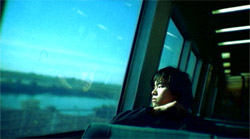 |
“Silence” (Allen Ho, 5 min.)
A young man recounts the language barriers between himself and his Mandarin-speaking, estranged parents — something most Asian-Americans can relate to. Amusing and mournful, The story ends in suspension, the son confronting the father after a long absence. Cinematically it’s gorgeous, with color-saturated, intimate camerawork (influenced by Wong Kar-Wai, the director said).
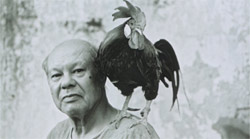 |
Pierre-Pierrot (Dir Nith Lacroix, 27 min.)
Probably the most involving entry in this shorts program, and the only true documentary. The film is split in half: in the first passage we (through the eyes of a first-person video camera) find ourselves in a Laotian town, visiting with the rotund, genial Pierrot. As we meander around, bearing witness to customs and daily rituals (a funeral ceremony, folk festival and church events, a walk down the street to greet the familiar faces of merchants, a folk song that speaks to the region’s long-standing isolation and sad past) it becomes clear that this video is a “video postcard” to be sent to Pierre, who emigrated to France years ago and has not been back since. The second half of the film switches to France, where Pierre (who turns out to be Pierrot’s twin brother –it’s a delightfully startling reveal) lives the life of an expatriate, presiding in bemused fashion over a community of Laos emigrees who attempt to maintain the old traditions and customs against the backdrop of this strange Western world. With subject matter like this, one only needs to point the camera and shoot, and Lacroix does so. It’s an elegy to a dying way of life, and a potent demonstration as to how the technical magic of film can cut through geographic and political boundaries.
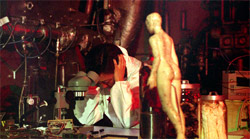 |
The Nothing Pill (Dir. Yu Gu, 6 min.)
A student film project from USC, and it plays like one — for good and ill. THX-1138 meets Buckaroo Banzai in a crazed future dystopia set in 2110, where a scientist must escape “individual termination” by coming up with a new drug that will cure isolation and loneliness. Reminders of the past and her parents come through as a hallucination in which Mom and Dad dress in China Red Guard costumes and dance to phonographs, all within a Kirk-era Star Trek milieu of red and blue lighting. Stuffed with zig-zag camera moves and elaborate sets, it certainly assaults the senses; harder to say if there’s a heart beating underneath, though.
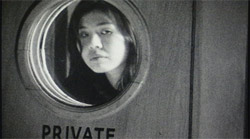 |
Cross Fader (Dir. Chihiro Wimbush, 5 min.)
Shot in stark black and white, this is a mood piece, as a woman finds her way into a radio station and listens to a tape left to her by her ex-boyfriend DJ — a recollection of a day spent driving to the beach, accompanied by fractured images of that trip. Originally intended to be a mystery-thriller by the director, the piece has morphed into a collage of visuals and sound that resolves into the pure white noise of surf pounding on sand. Slight but atmospheric, with some nice visuals of night-time Portland (where the director is based).
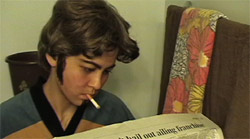 |
Dan Carter (Dir. Alison Kobayashi, 15 min.)
At first inexplicable, then beguiling and an all-out hoot. A performance piece that has the rigor of Kabuki theater, the concept is simple: utilizing a soundtrack taken from a tape full of answering machine messages to the title character, Kobayashi proceeds to act (or mime) the parts of all the characters leaving messages. We have laconic girlfriends, a raging ex-wife, winsome sons and daughters getting dropped off for visitation, representatives of the local church seeking donations, lawyers attempting to clean up messes, harried employees at the welfare office. Filmed in trailer-trash hell interiors and exteriors (Kobayashi hails from Hamilton, Canada), it’s a chintzy fuzz carpet of a skit, and an impressive piece of acting.
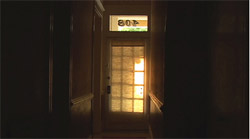 |
24 Frames Per Day (Dir. Sonali Gulati, 7 min.)
Visually this film is confined to a single shot: the front hallway of an apartment, captured over the course of many days and nights with time-lapse photography, figures and sunlight and shadows and night flitting by like flies. As we watch this kaleidoscope pass before us, we hear a conversation between an immigrant (the director) and her cab driver as he takes her home from the airport. Beneath it all seems to be a barbed statement of racial and national identities (the driver says at one point, “You’re Indian? As in red dot Indian, or feather Indian?”), but the issue gets muddy when the driver brings up topics (like Hindus vs. Muslims in India) that no self-respecting American yokel would be familiar enough with to debate. What does it all mean? Damned if I know, but it’s an interesting audiovisual collision.
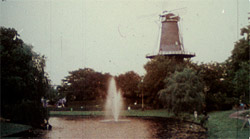 |
Dream of Me (Dir. A Moon, 10 min.)
Whatever else one can say about this one, one can’t dispute its intensity. A library newspaper reader ratchets away at whiplash speed, barely pausing on obituaries and seemingly random bits of news — and this goes on for five minutes (potential epileptics, beware). Beneath it all is a jumble of voices, and slowly we begin to understand that a long-lost sister has died, and yet knowledge about her life is hard to come by, due to family estrangement and legal obstacles. Just as we arrive at the official obituary, the only available evidence of her life, the scene abruptly switches to home movies of a European woman who coincidentally has the same name as the dead sister, a woman who is the friend of the unseen narrator, and has taken her role as a surrogate sister. It’s a lot of emotional and narrative content to pack in a short film, too much probably — things only became clear when the director explained the background after the screening (all based on her real-life experiences), but there’s certainly something obsessive and intriguing about this project, as incoherent as it may be.
 |
The Chestnut Tree (Dir. Lee Hyun-min, 4 min.)
A touching childhood reminiscence, told fairy-tale style with airy, simple animation strokes, rotoscoped ballet moves, and a tinkling little piano waltz. This one would fit in nicely with any animation program, and is a winsome conclusion to the program, following the knottiness of the previous two shorts. Even an SFIAAFF shorts collection seems to understand the maxim of show biz: send ’em home with smiles on their faces.
